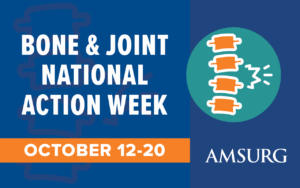 Muscles, joints and bones benefit from exercises like walking, resistance training and stretching.
Muscles, joints and bones benefit from exercises like walking, resistance training and stretching.
A recent paper published in the journal “Calcified Tissue International” recommends people of all ages engage in regular physical activity and reduce a sedentary lifestyle for long-term bone health.
The study suggests staying physically active improves bone mineral density and reduces fracture risk. Being sedentary, however, accelerates bone loss, stiffness and fracture risk.
Take Action During Bone and Joint Week
Bone and Joint Health National Action Week (Oct. 12-20) highlights preserving and protecting one’s musculoskeletal (MSK) health. Maintaining a healthy lifestyle with exercise and nutrition, and early screening for osteoporosis, arthritis and spinal issues, benefits a person’s quality of life.
The weeklong observance includes World Spine Day on Oct. 16, which “calls on individuals to adopt healthy habits such as maintaining good posture, engaging in regular physical activity and creating ergonomically friendly environments.”
Address Chronic Joint Pain
MSK conditions and arthritis-induced chronic joint pain contribute to disability and limited mobility for billions of people worldwide. Doctors may prescribe treatment plans to include medications and modified exercise programs for some patients and recommend surgery for others.
An estimated 790,000 total knee replacements and 544,000 hip replacements are completed every year in the U.S. According to the “Journal of Shoulder and Elbow Surgery,” between 174,000 and 350,000 shoulder replacement surgeries are projected this year in the U.S.
Recent reports indicate that orthopedic procedures like total knee, hip and shoulder replacements are moving rapidly from hospital settings to ambulatory surgery centers (ASCs).
AMSURG ASCs Prioritize Patient Care
AMSURG ASCs provide excellent care for patients daily. With more than 400 affiliated orthopedic physicians and 700+ affiliated MSK physicians, we perform more than 3,600 total joint replacements (TJR) and 130,000+ MSK procedures at more than 250 facilities nationwide.
“The [TJR] operation is basically the same as what we would do at the hospital,” said AMSURG physician partner Rajesh B. Makim, M.D., Blue Water Surgery Center, Port Huron, Michigan. “The costs are lower, and we have a more streamlined approach to getting people in and out of the door without compromising any patient care.”
ASCs offer same-day procedures using advanced technology in a comfortable setting with shorter waiting times, often at lower out-of-pocket costs. Patients have the convenience of recovering at home.
AMSURG physician partner Thomas E. Bates, M.D., has been doing outpatient TJRs at The Surgical Center of Morehead City in North Carolina for several years.
“That really has been a game-changer in the way of recovery and satisfaction from patients and their families,” he said.
Doctors determine whether patients are suitable for outpatient surgery based on their age, existing medical conditions and the support they receive at home.
“I tell you it was great for me,” said 65-year-old military veteran Jerry Novak, who had both knees replaced by Brad S. Cohen, M.D., at Poway Surgery Center in Poway, California. “I just like the idea of having comprehensive care in one place. It just seemed like a good fit for me. And it worked really well.”
About AMSURG
AMSURG is an independent leader in ambulatory surgery center services, operating a network of more than 250 surgery centers nationwide. In partnership with physicians and health systems, the organization delivers high-quality patient care across a diverse spectrum of medical specialties, including gastroenterology, ophthalmology and orthopedics. Guided by its core values — Care Deeply, Champion Excellence, Cultivate Integrity and Celebrate Teamwork — AMSURG is committed to transforming the future of ambulatory surgery center care and services with a focus on strategic growth and innovation. To learn more about AMSURG, visit www.amsurg.com.
